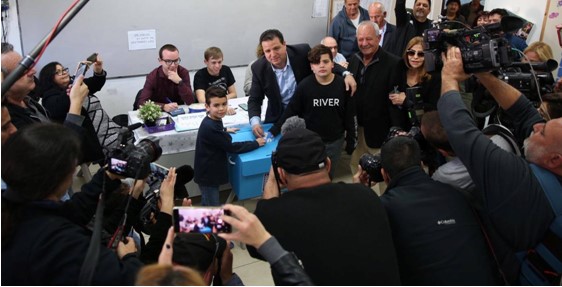Far-right Likud leader and acting Prime Minister, Benjamin Netanyahu, appeared poised for an electoral victory Tuesday morning, March 3, though questions remained over whether he had enough support to form a coalition, as votes were still being counted following Monday’s general election, the third in the last 11 months.
With some 90% of the ballots tallied, the Likud had 29% of the counted votes, equal to around 36 Knesset seats. Top rival MK Benny Gantz of Blue & White trailed with 26% of the votes, representing some 32 seats in the parliament which, if these results are final, would represent the relatively new faction’s worst showing in three tries. With 90% of ballots counted, the Joint List had garnered a record of 15 seats, up from the 13 it currently has.

MK Ayman Odeh voting at his neighborhood polling station in Haifa, Monday, March 2, 2020 (Photo: Zu Haderech)
“The problem was Blue & White’s racist attitude,” said Joint List chairman, MK Ayman Odeh (Hadash) on Tuesday, accusing Gantz of turning Blue & White into a “pale imitation” of the right wing. “We did our part. They failed, for us, but this is the greatest parliamentary achievement for the Arabs and democratic Jews in Israel since the state’s founding,” he said.
“Jewish-Arab partnership is the cornerstone of any deep change in the country, of true peace, of true democracy, of true equality,” said Odeh. “It has to be done together, by Arabs and Jews. This Jewish-Arab cooperation is vital and just getting started,” the leader of the Joint List stressed. “But we’re not stopping with the Joint List,” he said. “This is just the beginning, towards building a massive movement that will be a home for all those who are marginalized in this society. A Jewish-Arab slate of the marginalized, who have a common interest to live together in a society based on social justice.”
Monday’s election marked another setback for the Zionist Left, particularly to the once mighty Labor party, which governed the country for its first three decades. The Labor-Gesher-Meretz alliance was projected to get just six or seven seats, making it one of the smallest factions in parliament, with only three MKs for the Labor party and two for Meretz.


